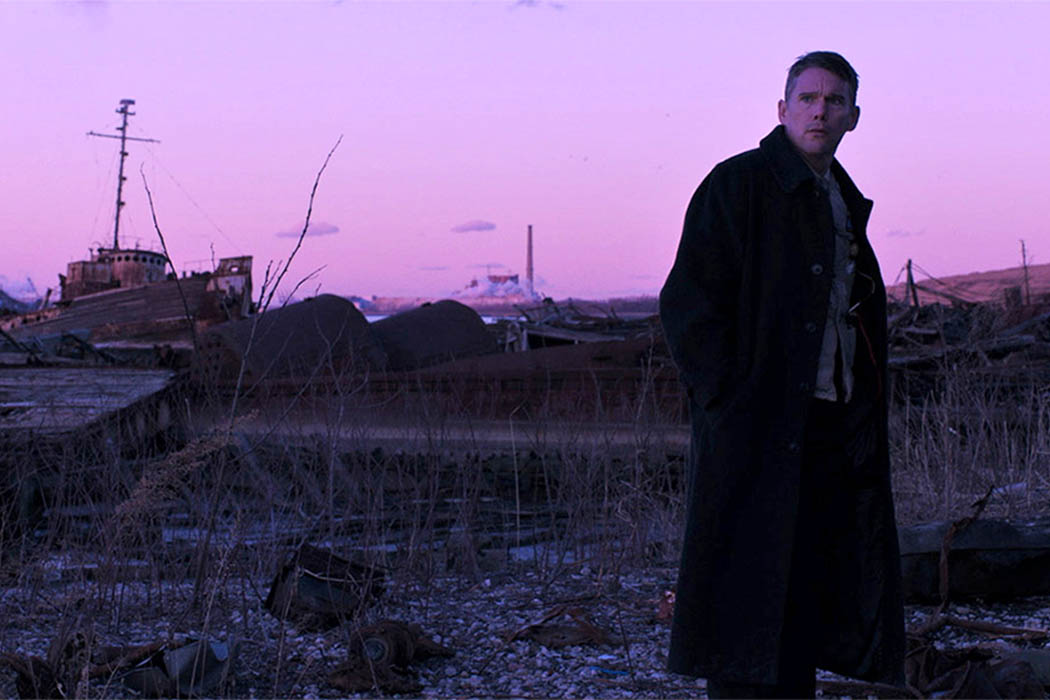In the introduction to the new edition of his critical text, Transcendental Style in Film, Paul Schrader recalls the temerity with which he first wrote the book as a graduate student in 1971, as well as the panel discussion a half-century later that ultimately led him to start rethinking his earlier work. It seems that his recent rethinking was not content to be cloistered away on the page; Schrader needed to put his new theory into practice. With First Reformed, he has done so in a magnificent fashion.
By transcendental style, Schrader refers to a certain tradition of “slow cinema” in the vein of such diverse filmmakers as Robert Bresson, Yasujirō Ozu, and Carl Theodor Dreyer. Transcendental film is metaphysical in nature, meditative in form. It is concerned with existential questions of love, death, and—perhaps most important to First Reformed—God, or his absence. Schrader’s new film follows Reverend Ernst Toller (Ethan Hawke), a Protestant pastor in upstate New York who wrestles with his faith while counseling a troubled young married couple. The husband, Michael (Philip Ettinger), is an environmentalist just returned home from a stint in jail related to his activism. He is in despair over the progression of climate change and the horror of what the planet will look like by the time his unborn child becomes an adult. His wife, Mary (Amanda Seyfried), shares Michael’s activist leanings but not his anguish. She asks Toller to intercede, to try to rescue her husband from his despondency. Instead, he inherits it.
First Reformed is, in many ways, a departure from Schrader’s earlier work. Despite his initial attraction to transcendental style, he built a career with the tools of a more traditional cinema: namely, action and empathy. Schrader’s name is still probably most closely associated with one of his earliest screenplays, Taxi Driver, a brutal film that could not be further from the contemplative, minimalist works of an Ozu or Bresson. Or could it? Schrader points to Bresson’s Pickpocket as inspiration for the screenplay, along with a brief period he spent living out of his car and cruising the not-so-sunny boulevards of Los Angeles. First Reformed is as much a call back to Taxi Driver as it is to the works of Schrader’s cinematic idols. First Reformed’s Toller and Taxi Driver’s Travis Bickle share a certain personality trait, what Schrader has referred to as an obsession with the “pathological allure of suicidal glory.” Both men imagine themselves to be martyrs. They want to clean up the world around them, by any means necessary. Both also happen to enjoy their breakfast with whiskey poured over top.
At their cores, Toller and Bickle are consumed by a fixation with redemption. What manifests itself in Bickle’s schizophrenic credo and chauvinist tendencies appears in Toller’s extreme asceticism and self-imposed isolation. I’ll let you decide whether either man finds the redemption that he seeks. But that’s not the only kind of redemption at play in First Reformed. Within another frame, Schrader himself is out to reform transcendental style. In his return to critical work, Schrader argues that some contemporary filmmakers have bastardized transcendental style and lost sight of how the form is meant to function. Through formalistic attempts to push the boundaries of non-narrative cinema, some directors have forgotten that the transcendence meant to be achieved is that of the viewer, not the filmmaker. They value abstraction over communication to the detriment and alienation of their audiences; much like Toller, they are preachers without a congregation. While I won’t claim to know whether Schrader will succeed in his redemptive mission, or whether Reverend Toller will ever find the God he’s been searching for, perhaps Schrader put it best himself when asked about his faith at last year’s Toronto International Film Festival: “Maybe I’m a believer in believing. Maybe that’s as close as we can ever get.”
First Reformed (2017), dir. Paul Schrader, 113 min.
With Amanda Seyfried, Ethan Hawke, Cedric the Entertainer, Victoria Hill
Regal Downtown West Cinema 8, 1640 Downtown West Blvd.
Showtimes






